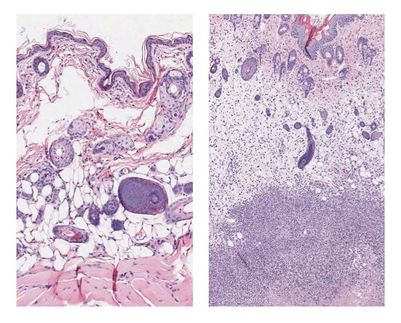Stress signals link pre-existing sickness with susceptibility to bacterial infection
Repeated stress signals made in cells with metabolism-associated disease encourage the growth of invading bacteria
Advertisement
Mitochondrial diseases disrupt the power generating machinery within cells and increase a person's susceptibility to bacterial infection, particularly in the lungs or respiratory tract. A new study published in Disease Models & Mechanisms (DMM) shows that infection with the pneumonia causing bacteria Legionella, is facilitated by an increased amount of a signaling protein that is associated with mitochondrial disease.
Patients with mitochondrial disease exhibit a wide range of symptoms including diabetes, blindness, deafness, stroke-like episodes, epilepsy, ataxia, muscle weakness and kidney disease. The metabolic abnormalities that cause these effects also induce a stress signal intended to help the body overcome its energy deficit. The stress-signal induces the production of more mitochondria, the energy generating 'powerplants' of the body, in the hopes that more mitochondria will result in a better power supply. Researchers now show that the stress-signal associated with mitochondrial disease facilitates the growth and reproduction of the lung-infecting bacteria, Legionella.
Cells with mitochondrial disease increase their production of a signaling protein called AMP-activated protein kinase (AMPK), to promote the generation of more energy producing mitochondria. Infectious bacteria, like Legionella, target the mitochondria and might use them to supplement their own needs and survival requirements. By manipulating AMPK levels, scientists were able to directly influence the ability of bacteria to replicate inside of the single-celled organism, Dictyostelium.
Striking similarities that exist between simple organisms like Dictyostelium and humans allow scientists to use them to understand human disease. Dictyostelium is a free-living amoeba whose rapid movements make it useful to study motility and energy regulation, and in this case, the association between energy regulation and susceptibility to infection. Like humans, Dictyostelium can be infected by Legionella and quickly responds by producing a host of metabolism-associated proteins. Another similarity between humans and Dictyostelium is that both use AMPK as an internal sensor to coordinate energy synthesis with energy needs. However, unlike humans, researchers can infect Dictyostelium with germs like Legionella in a controlled environment and determine the influence of various parameters on the course of infection.
Original publication: Lisa Francione, Paige K. Smith, Sandra L. Accari, Paul B. Bokko, Paul Fisher, Salvatore Bozzaro, Phillip E Taylor, Peter L. Beech; "Legionella pneumophila multiplication is enhanced by chronic AMPK signalling in mitochondrially diseased cells"; Disease Models & Mechanisms (DMM) 2009.























































